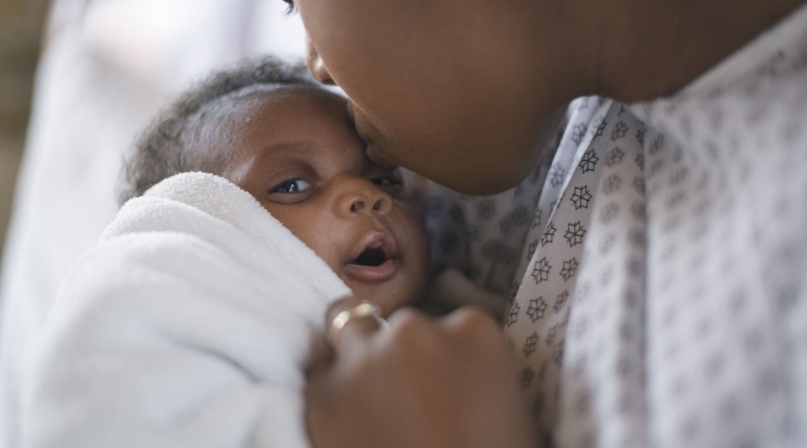North Carolina county program aims to reduce high Black infant mortality rate

Key Takeaways
The Black infant mortality rate in the United States is more than double that of white infants, at 10.4% and 4.4%, respectively, according to CDC data.
For decades, the disparity in Guilford County, N.C. has consistently been even worse. To bridge that gap, the county is aiming to reduce its racial disparity in infant mortality by 50% in five years and eliminate it completely within the next decade through its Every Baby Guilford initiative.
To determine the programming and resources that could best serve Black infants and parents, the county gathered community members with lived experience, providing them with gift card incentives to share input, and worked with Root Cause Institute to create the collective action framework.
Out of those discussions came Every Baby Guilford’s four strategic priorities: Advance health equity by addressing systemic racism and implicit bias for maternal and infant health; center community with radically inclusive community engagement that creates collaborative solutions; strengthen the continuum of care of reproductive life planning for equitable access to quality care and promote infant wellness and positive child development.
To address them, Guilford County launched a doula program, increased the number of Centering Pregnancy sites across the county and expanded its outreach, hiring community health workers who work in areas with the highest disparity rates to identify best practices in spreading resource information and creating a Health Ambassador program where the county trains and pays community members to serve as social influencers in perinatal health.
Prior to the creation of Every Baby Guilford, the county’s infant mortality efforts were centered on its Adopt-A-Mom program, which helps pregnant women (who aren’t eligible for Medicaid and can’t afford to pay out of pocket) access prenatal care. The program primarily serves undocumented residents in the county originally from South America, because they don’t qualify for Medicaid.
Jean Workman, Every Baby Guilford’s program manager, led the county’s efforts to expand its prenatal care offerings with its Black population in mind.
“Our Hispanic infant mortality rate is pretty much equal to that of white rates,” Workman said. “So, my question coming into this role was, ‘Why on earth is our focus on infant mortality reduction in the community linking individuals to prenatal care who already have pretty quality birth outcomes?’ Where’s our focus when our disparity rates are high among Black families? … I wanted Guilford County to name racism as a culprit in maternal health.”
The Guilford County Board of Commissioners provided $800,000 in funding to Every Baby Guilford, creating two new positions dedicated to infant mortality in the county’s public health division — a health equity manager and a perinatal health coordinator. In addition, one staff member was promoted to serve as fetal infant mortality review (FIMR) coordinator, making Guilford County the first county in the state to implement a FIMR.
The initiative also received a two-year $950,000 grant through the state that allowed the department to hire two community health workers and a grants coordinator.
“I’ve never in my life felt that weight of support from our county leaders saying, ‘We’re naming this as a strategic priority for us, thank you for naming it as a strategic priority in the work that you’re doing, and we want to provide you with the financial resources, so that you don’t feel hindered or handicap to get the work accomplished,’” Workman said. “Every Baby Guilford is now what I would refer to as the conductor of the community’s orchestra for infant mortality disparity reduction.”
Guilford County is set to hire five contractual doulas to provide birthing support to 60 expectant Black mothers and is partnering with the Asheville organization Sistas Caring 4 Sistas for training assistance support and education. The county will pay the doulas $1,200 for each birth they support and has also hired a doula coordinator to oversee the program.
“We convened Black and brown doulas in the community and the number one feedback we heard was, ‘Our white counterparts make a living in this, but we don’t because we keep being asked to support births for free,’” Workman said. “So we said, ‘We hear you and we want to create a plan that’s going to help you create the plan and provide you with the business support, utilizing some of our community-based partners across the state who have developed successful businesses.’”
The racial disparity in infant mortality is hardly an issue specific to Guilford County — Black infants have higher mortality rates than white infants in every single county in the country, according to the National Library of Medicine. Regardless of resources or size, counties should gather stakeholders in maternal and infant health as partners to jumpstart work at the local level to alleviate the crisis, Workman said.
“I would pull your hospital, your health department, anybody who’s going to have impact in that work who would have interest to be there together,” Workman said. “Inspire a vision of something you want to tackle and name it … You form your work group of who is going to come to the table, and if you don’t have any money to come to the table with it, those partnerships are going to be even more vital because you’re inviting them as thought leaders, but you’re also inviting what stake they can put into it financially to help move the meter.”
Guilford County’s “Every Baby Guilford” was a 2023 Best in Category Achievement Award winner in the Health Category.
Related News

White House Executive Order establishes national substance use disorder response
On January 29, the White House issued an Executive Order (EO) establishing the Great American Recovery Initiative, a new federal effort aimed at coordinating a national response to substance use disorder (SUD).

USDA and HHS release new dietary guidelines
On January 7, U.S. Department of Agriculture Secretary Brooke Rollins and U.S. Department of Health and Human Services Secretary Robert F. Kennedy, Jr. unveiled the new Dietary Guidelines for Americans, 2025–2030.

SAMHSA cancels, reinstates thousands of behavioral health grants
Late on Wednesday, January 14, the Administration announced that thousands of Substance Abuse and Mental Health Services Administration (SAMHSA) grants that had been terminated just one day earlier would be reinstated.
News
Announcing 2023 Achievement Award Winners

